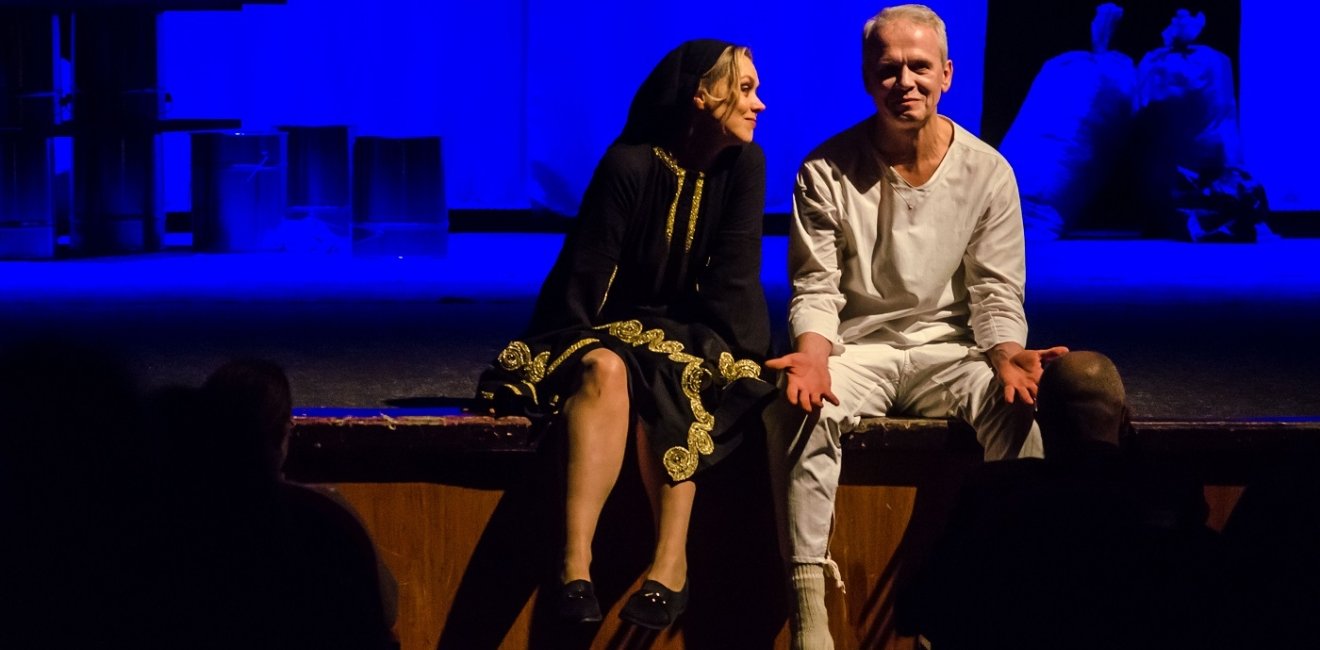
A blog of the Kennan Institute
BY BLAIR A. RUBLE
Several of Ukraine’s leading theater artists joined together in late July to stage Natalka Vorozhbyt’s play about wartime, Sasha, Take Out the Trash. The production took place in Odesa, a city increasingly on the front line of Ukraine’s war with Russia, giving new meaning to a work that dates from 2015.
Sasha is a one-act, domestic, mystical play about the victory of life over death in a time of war. Sasha is an officer who died of heart failure before the war in Ukraine began in 2014. He is convinced that death offers no excuse for failing his oath to protect the Motherland. He wants to return to fight, but his wife and pregnant stepdaughter will only take him back in renewed life if he returns to his family rather than the front. They want him to take out the trash.
The play has been performed in Ukraine, Belarus, Scotland, and elsewhere. In response to the wartime conditions in Odesa, the participating artists—including director Maksym Golenko, set designers Pavlo Ivlyushkin and Denys Hryhoruk, and actors Oleksandr Samusenko, Ihor Herashchenko, Ninel Natocha, and Iryna Okhotnichenko—have launched the play in a new “theater as shelter” format. The scenery and costumes are designed to be easily transported and the cast has been kept small so that the play can be produced anywhere that is safe.
Vorozhbyt ranks among Ukraine’s most compelling contemporary playwrights. Now in her 40s, she emerged together with her country’s post-independence theater scene after graduating from the Maxim Gorky Literature Institute in Moscow. Writing in Russian and Ukrainian, her 2020 movie Bad Roads, about the conflict in Donbas, received international acclaim and is now available on HBO. The Royal Shakespeare Company performed The Grain Store, her 2009 play about the Holodomor (the 1930s famine), at London’s Royal Court Theater.
Vorozhbyt’s biography reflects the consolidation of a Ukrainian identity over the past several decades. In addition to her studies in Moscow, she worked on the Russian television series School, a portrayal of Moscow high school students created by some of the most significant writers of her generation. The show proved too realistic for Russian television executives and their political overseers, who closed it down after just four months on the air. Meanwhile, Ukraine beckoned.
Living in her native Kyiv when the 2014 Euromaidan revolt broke out, Vorozhbyt joined those on the barricades. That experience, combined with the war touched off by Russian-backed separatists in the Donbas, deepened her commitment to helping Ukraine choose its own future. She turned to play- and script-writing to express her deep concern over the tragedy that was about to happen in Ukraine. As she later told the Financial Times, her plays were—and are—her way of trying to warn people in the West that Putin’s Russia is a threat to everyone. Over time, she switched from writing in Russian and began using Ukrainian in her professional life.
Living in Kyiv when Russia invaded Ukraine earlier this year, she made her way first to Lviv, and later, Krakow and Vienna. Subsequently, she has joined with Maksim Kurochkin and others in Kyiv’s Theater of Playwrights to promote new Ukrainian theater. The Theater of Playwrights has joined the Worldwide Ukrainian Play Readings project headed by John Freedman to bring nearly 100 plays written since February to nearly 200 readings in over 20 countries (see previous posts from March 23, 2022 and May 16, 2022).
The idea of theater in a city under attack is challenging. There are so many other concerns that seem to be more pressing. Nonetheless, theater is coming to play an essential role in the current conflict in Ukraine. It has become an important vehicle for Ukrainians struggling to comprehend what has happened. It establishes a dialogue between actors and audience, between Ukrainians, and between those in Ukraine and those abroad, which has molded how they—and we—understand what has gone on, individually and collectively. Sometimes, Vorozhbyt tells us, simple tasks such as taking out the trash reveal profound insights into the human condition.
The opinions expressed in this article are those solely of the author and do not reflect the views of the Kennan Institute.
Author

Former Wilson Center Vice President for Programs (2014-2017); Director of the Comparative Urban Studies Program/Urban Sustainability Laboratory (1992-2017); Director of the Kennan Institute for Advanced Russian Studies (1989-2012) and Director of the Program on Global Sustainability and Resilience (2012-2014)

Kennan Institute
After more than 50 years as a vital part of the Wilson Center legacy, the Kennan Institute has become an independent think tank. You can find the current website for the Kennan Institute at kennaninstitute.org. Please look for future announcements about partnership activities between the Wilson Center and the Kennan Institute at Wilson Center Press Room. The Kennan Institute is the premier US center for advanced research on Eurasia and the oldest and largest regional program at the Woodrow Wilson International Center for Scholars. The Kennan Institute is committed to improving American understanding of Russia, Ukraine, Central Asia, the South Caucasus, and the surrounding region through research and exchange. Read more

Explore More in Focus Ukraine
Browse Focus Ukraine
Talking to the Dead to Heal the Living

Ukrainian Issue in Polish Elections


